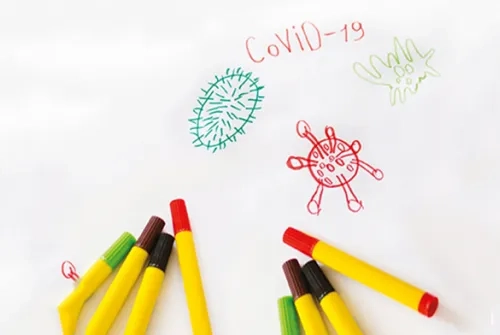Alo Yeditepe
Alo Yeditepe
Protecting Children from COVID-19
While the fight against the Covid-19 pandemic continues, precautions that need to be taken individually are important. However, especially parents can worry about protecting their children.
In addition, since children have a high risk of spreading the disease rather than catching it, necessary precautions should be taken for children and young people.
Precautions to Keep Children Safe
Teach Children the Rules of Hygiene
Teach them to wash their hands properly and make sure they wash their hands properly: Proper hand washing is at the forefront of the precautions to be taken to protect against Covid-19. Therefore, first of all, explain the importance of hand washing to children and teach them how to wash their hands with soap and water for 20 seconds. Make sure to wash your hands before and after meals and after being in public spaces. In areas where water is not available, use hand sanitizer and ensure that it is spread on the entire hand, including the top of the hands and between the fingers.
Washing your hands, when necessary, will make it easier for them to acquire this habit.
Make sure they do not touch their face with their dirty hands: Although it is difficult to get a child to do this, explain to children that they should not touch their mouth, nose, or eyes without washing their hands. Teach them that if their nose is itchy for any reason, they should definitely use a tissue and then discard it. Make sure they use a tissue when sneezing and coughing, and then discard it.
Keep the Immune System Strong
Provide a regular and balanced diet: One of the most important reasons for the weakening of the immune system is malnutrition and sedentary life. Therefore, ensure that children also have a regular and balanced diet.
Eating fish at least three days a week, giving weight to legumes in nutrition, eating seasonal vegetables, and consuming animal foods such as milk buttermilk, yogurt, and kefir are important in strengthening the immune system. Help them engage in regular physical activity. Outdoor walking, running, and cycling are fun activities for children.
Do not change the sleep pattern: The serotonin hormone secreted while sleeping accelerates the immune response against infections. For this reason, make sure that children get enough sleep according to their age groups. Try not to change your sleeping pattern as much as possible.
Make sure they drink enough water: Water is very important in increasing body resistance and keeping immunity strong. Therefore, ensure that children consume plenty of water throughout the day.
Do Not Take Them To Closed Areas
Make sure they do not touch surfaces in crowded environments:
Try not to go to closed and crowded areas. Keep your children away from closed areas such as shopping malls. Try to produce creative solutions as it can be difficult to explain this to children. It will also be beneficial to wipe the sofas or tables in common use with a refreshing towel before using them.
Keep them away from sick people:
Make sure that children are not near people with symptoms such as sneezing or coughing. Make sure to take protective measures.
Make Sure to Warn Your Guests
Ask guests coming from outside to wash their hands
Also, do not shake hands or give kisses.
If there is a sick person in the family, ask them to use a mask
If someone in the family has a fever or cough, make sure they use a mask, and pay more attention to hand washing. Avoid contact with sick people with your child as much as possible.
Pay Attention to These Points When You Go Out
- Make sure that children wear masks when they go out for any reason.
- Children can play in the garden of the house, if possible. Follow physical distance rules in crowded and public areas such as playgrounds.
- In places where common areas are used, such as the housing estates, make sure that children follow the rules of physical distance while playing.
- If children come into contact with each other, be sure to clean their hands. Make sure the playgrounds in the housing estates are cleaned regularly. Clean children's hands regularly with hand sanitizer.
- After coming home, be sure to remove masks properly and discard them. If possible, children should take a shower. If not, clean their hands and face with soap and water.
Be Their Role Model
While all people are worried and concerned with the danger of coronavirus, children expect explanations from their families to comfort them. Parents need to be very careful about this.
It is a very natural human behavior for every parent to think about their children and therefore be worried about them. However, especially in this period, parents may adopt different attitudes and behaviors in order not to show their stress and anxiety to their children. Sometimes they can be undecided about how to behave. At this point, experts say that parents should not hide their facial expressions from their children due to anxiety.
Because it is perfectly normal for children to see their parents as anxious or a little sullen. On the contrary, being in a strange comfort and not making children feel anything can be the main anxiety factor. Since children learn from the reactions of their elders, who are role models in life, it is necessary to try to behave calmly without panic or fear.
This content was prepared by Yeditepe University Hospitals Medical Editorial Board.
”
See Also
- Is Swallowing Cat Hair Dangerous?
- Does Breast Milk Protect Against Diseases?
- What is Heel Blood? Why is heel blood taken?
- What is Predisposition to Allergy (Atopy)?
- How Can We Protect Children from COVID-19 Coronavirus?
- Allergies in Children Can Increase During the Summer Months
- Benefits of Breast Milk and Breastfeeding
- When do Babies Start Walking?
- When do Babies Start Talking?
- Special Care for Premature Babies
- Key Parts of Children's Nutrition on Holidays
- What Diseases Can Insomnia Cause in Children?
- What is the Goal in Newborn Intensive Care Treatment?
- How to Choose Baby Clothes?
- Reflux Complaints Have Increased in Babies!
- Set the Rules from the Beginning!
- What is a Premature Baby and How to Feed it?
- If Your Child is Constantly Getting Sick in the Winter, It Could be Due to Allergies
- Even If Your Child is Sick, They Must Take a Bath
- It is Possible to Protect Children From Diseases with Simple Precautions
- Vaccine Rejection Can Lead to Irreversible Problems!
- Importance of Vaccination in Children
- The Most Common Skin Rashes in Newborns
- Preschool Health Checks Increase Socialization and Success
- Ten Hints for Providing Care for Premature Babies
- Are Pre-School Health Checks Done?
- Children Whose Parents Are Allergic Are More At Risk
- Keep It Away From Packaged Products To Strengthen Children's Immunity
- Vitamin D May Be the Cause of Your Fatigue
- Does Hypertension Lead to Growth Retardation in Children?
- Pay Attention to the Children Who Get Sick Often
- Rashes That Require Attention in Children
- ‘Hand, foot, mouth disease’ Warning from the specialist of the subject: "It is more Common in Children Going to the Pool in Summer!”
- Allergic Disease Rates Increased from 3% to 15% in the Last 20 Years
- 648 Grams Born Baby “Umut” Succeeded in Clinging to Life
- High Fever in Children Article Series I
- High Fever in Children Article Series II
- High Fever in Children Article Series IV
- High Fever in Children Article Series V
- Hot Shock in Children
- Genetics is the Key Cause of Food Allergies in Children
- Notice the Dangers in the School Bag!
- Pay Attention to Food Allergies in Children!
- How Should the Development of a Baby Be?
- Complementary Foods for Babies
- High Fever in Children
- How Should I Dress My Baby?
- Points to Be Considered in Baby Clothing
- Choosing Summer Clothes for Kids and Babies
- What Should a Family with Children Have in Their Summer Suitcase?
- How to Feed Newborn Babies and Toddlers in the Summer?
- What and How Much Should Children Eat at Which Time of Meal?
- What is the Right Lunch Box for Children?
- Breastfed Babies Have Lower Blood Pressure, and Their Hearts are Healthier
- Infection Can Cause the Onset of Asthma Disease
- Necessary Precautions to Protect Children from the Harmful Effects of the Sun
Alo Yeditepe











